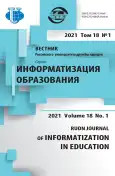Development of information culture of students when teaching equations of mathematical physics in the conditions of informatization of education
- Авторлар: Kornilov V.S.1, Rusinov A.S.1
-
Мекемелер:
- Moscow City University
- Шығарылым: Том 18, № 1 (2021)
- Беттер: 81-87
- Бөлім: INNOVATION PEDAGOGICAL TECHNOLOGIES IN EDUCATION
- URL: https://journal-vniispk.ru/2312-8631/article/view/321208
- DOI: https://doi.org/10.22363/2312-8631-2021-18-1-81-87
- ID: 321208
Дәйексөз келтіру
Толық мәтін
Аннотация
Problem and goal. In modern conditions, specialists in various subject areas who have an information culture and are able to solve complex professional problems using modern information and communication technologies are in demand. Currently, specialists in the field of applied mathematics are required, which plays an important role in the development of human civilization. Therefore, in the process of teaching various academic disciplines of applied mathematics at the university, including the discipline “Equations of mathematical physics”, attention should be paid to the development of students’ information culture. Methodology. When teaching students the discipline “Equations of mathematical physics”, it is extremely important that the teacher knows not only the content of teaching this discipline of applied mathematics, but also has practical experience in solving equations of mathematical physics by computer means. Such qualities of the teacher will allow him to successfully conduct training sessions in the conditions of informatization of teaching mentioned discipline. At the same time, it ought to be clearly understood that the use of computer technologies in teaching the discipline “Equations of mathematical physics” must be correct. The necessity to develop and implement in practice a variety of methodological approaches that allow students to develop an information culture in training sessions on that discipline is obvious. Results. The use of advanced pedagogical technologies in training sessions on the discipline “Equations of mathematical physics”, where computer technologies are used, will allow students to develop an information culture. Conclusion. Computer technologies that students use in the process of solving educational problems require them to have certain skills and abilities to identify their broad capabilities. Students are aware of the role of computer technologies in conducting applied scientific research, understand the role of computer modeling methodology and computational experiment in studying the world around them.
Негізгі сөздер
Авторлар туралы
Viktor Kornilov
Moscow City University
Хат алмасуға жауапты Автор.
Email: vs_kornilov@mail.ru
Candidate of Physical and Mathematical Sciences, Doctor of Pedagogical Sciences, Full Professor, Professor of the Department of Informatization of Education
29 Sheremetyevskaya St, Moscow, 127521, Russian FederationAlexey Rusinov
Moscow City University
Email: aleksey@rusinov.name
postgraduate student of the Institute of Digital Education
29 Sheremetyevskaya St, Moscow, 127521, Russian FederationӘдебиет тізімі
- Volgusheva AA. Development of information culture. (In Russ.) Available from: https://center-yf.ru/data/stat/razvitie-informacionnoy-kultury.php (accessed: 15.09.2020).
- Vohrysheva MG. Information culture and media culture: dynamics of development. Modernization of Culture: from a Person of Tradition to a Creative Subject: Materials of the V International Scientific and Practical Conference (Samara, 29-30 May 2017). Samara: SGIK Publ.; 2017. p. 18-23. (In Russ.)
- Gendina NI. Information culture as a phenomenon of the information society and the field of educational activity. Culture of Russia, Based on Knowledge: Traditions and Innovations of Training in the Field of Culture and Art. Kemerovo: KemGIK Publ.; 2019. p. 237-257. (In Russ.)
- Gajdareva IN. Information culture of the individual in the conditions of transformation of the Russian society: sociological aspect (Dissertation of the Candidate of Sociological Sciences). Majkop; 2002. (In Russ.)
- Elistratova NN. Information culture as a criterion for informatization of higher education in modern conditions of reforming. Modern Scientific Researches and Innovations. 2012;7(15). (In Russ.) Available from: http://web.snauka.ru/issues/2012/07/15770 (accessed: 15.09. 2020).
- Kirillova NB. Mediakul'tura: teoriya, istoriya, praktika [Media culture: theory, history, practice]. Moscow: Akademicheskij proekt Publ.; Kul'tura Publ.; 2008. (In Russ.)
- Krasnova OV. Development of information culture of the individual as a complex professional and pedagogical. (In Russ.) Available from: http://ro.mgou.ru/catalog/category 144/58.html (accessed: 15.09. 2020).
- Koval TS. Development of the content of the concept “information culture of personality”. Tomsk State Pedagogical University Bulletin. Series: Pedagogy. 2007;7(70):67-72. (In Russ.)
- Blekhman IM, Myshkis AD, Panovko YaG. Prikladnaya matematika: predmet, logika, osobennosti podhodov [Applied mathematics: subject, logic, features of approaches]. Moscow: KomKniga Publ.; 2005. (In Russ.)
- Denisov AM, Dmitriev VI. (eds.) Izbrannye trudy A.N. Tihonova [Selected works of A.N. Tikhonov]. Moscow: MAKS Press; 2001. (In Russ.)
- Kornilov VS. Inverse problems in academic disciplines of applied mathematics. Vestnik of Moscow City University. Series: Informatics and Informatization of Education. 2014;1(27):60-68. (In Russ.)
- Kornilov VS. Role of training courses of computer science in education students of high schools to numerical methods. Bulletin of Peoples’ Friendship University of Russia. Series: Informatization in Education. 2011;(3):24-27. (In Russ.)
- Kornilov VS. Teaching inverse problems for the differential equations as fundamentalization factor of mathematical knowledge of students. Bulletin of Peoples’ Friendship University of Russia. Series: Informatization in Education. 2015;(1):63-72. (In Russ.)
- Kornilov VS. University training of specialists in applied mathematics-history and modernity. Science and School. 2006;(4):10-12. (In Russ.)
- Levchenko IV, Kornilov VS, Belikov VV. The role of informatics in training specialists in applied mathematics. Vestnik of Moscow City University. Series: Informatics and Informatization of Education. 2009;2(18):108-112. (In Russ.)
- Belenkova IV. Methods of using mathematical packages in professional training of university students (Dissertation of the Candidate of Pedagogical Sciences). Ekaterinburg; 2004. (In Russ.)
- Goloskokov DP. Uravneniya matematicheskoj fiziki. Reshenie zadach v sisteme Maple [Equations of mathematical physics. Solving problems in the Maple system]. Saint Petersburg: Piter Publ.; 2004. (In Russ.)
Қосымша файлдар









